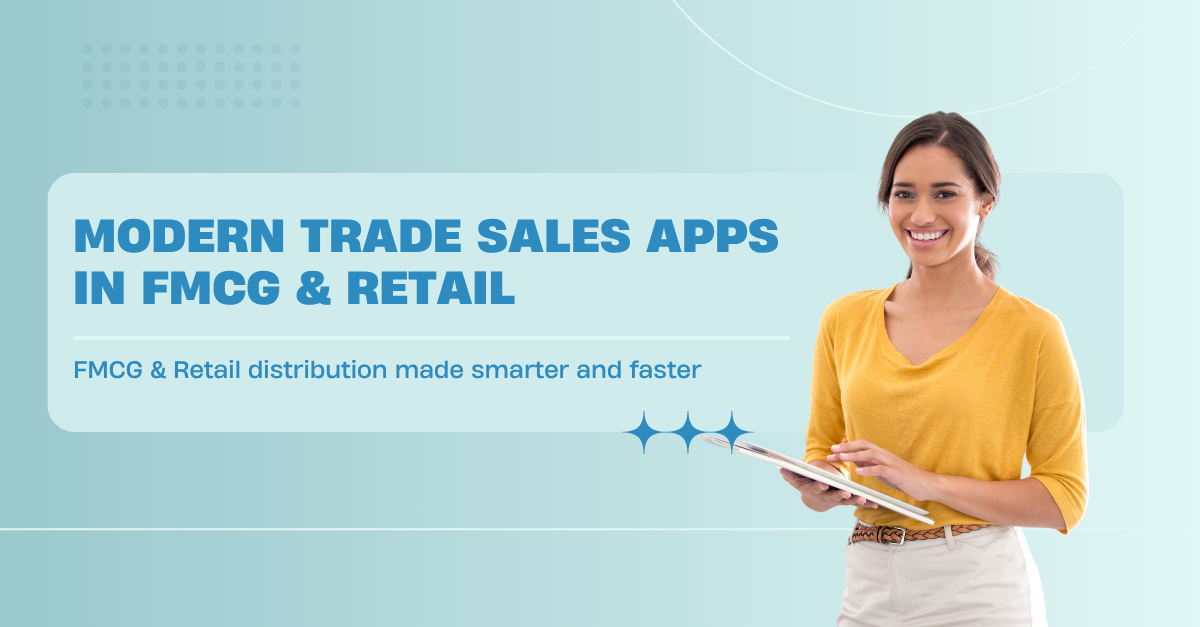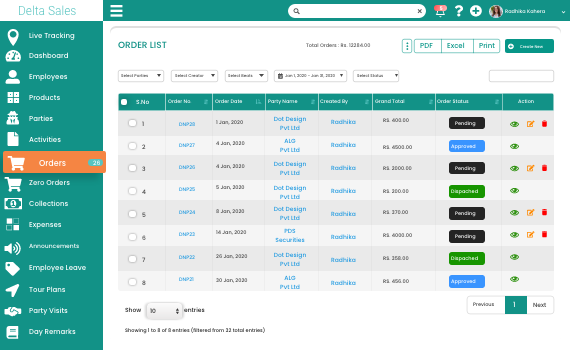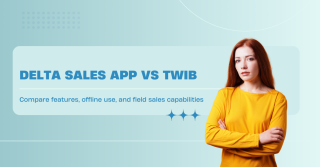How Modern Trade Sales Apps are Transforming FMCG and Retail Distribution

The FMCG and retail sectors are evolving rapidly, driven by changing consumer preferences, expanding product lines, and growing competition. Traditional sales and distribution methods can no longer keep up. Modern trade sales apps are transforming this landscape by automating processes, enhancing field visibility, and enabling smarter decision-making.
These digital tools streamline workflows, provide real-time insights, and boost productivity for sales teams. Features like mobile order-taking, inventory tracking, and route optimization make operations faster, more accurate, and data-driven. By adopting these apps, FMCG and retail businesses can optimize sales, improve efficiency, and stay ahead in a competitive market.
Let’s explore how modern trade sales apps are transforming the FMCG and retail distribution landscape
What Are Modern Trade Sales Apps?
A modern trade sales app is a digital tool designed specifically to optimize sales operations in modern retail environments. Unlike conventional systems that rely heavily on manual reporting, spreadsheets, and fragmented processes, these apps provide real-time visibility into sales activities, inventory levels, and customer interactions.
For FMCG companies and distributors, the benefits extend far beyond simple task management. Modern trade sales apps integrate features like order management, route planning, performance analytics, and automated reporting. By connecting the field sales team with managers and other departments, these apps ensure that everyone is working with the same accurate, up-to-date information
The Rising Complexity of FMCG and Retail Distribution
Fast-moving consumer goods (FMCG) supply chains have historically been intricate, yet current hurdles are unlike any before. Given growing product selections, quicker product turnover, and heightened market rivalry, overseeing retail delivery demands exactness and immediate oversight.
Older sales frameworks lean heavily on hands-on work, sales agents recording orders physically, supervisors depending on slow-to-update spreadsheets, and distributors processing requests via telephone. This situation often results in:
-
Delayed decision-making
-
Errors in stock management
-
Inefficient route planning
-
Lack of visibility into field performance
Consequently, manufacturers have difficulty ensuring uniform market presence, resulting in missed revenue chances. To surpass these operational gaps, FMCG executives are turning more frequently to up-to-date field sales technologies that simplify workflows, automate data compilation, and boost teamwork.
Features Behind the Transformation of Modern Trade Sales
Modern trade sales apps aren’t just another CRM they’re purpose-built for the FMCG and retail ecosystem. Here’s how their key features are transforming how businesses sell, manage, and grow.
Real-time Sales Tracking
Real-time sales tracking gives both field reps and managers an accurate picture of what’s happening on the ground. Each order, outlet visit, and sales activity is recorded instantly within the app. This eliminates guesswork and provides up-to-the-minute insights into product performance, sales trends, and territory coverage.
With this visibility, managers can compare targets versus achievements, spot underperforming regions, and make strategic adjustments quickly.
Smarter Order Management

Inefficient order processing can cripple even the best sales strategies. Modern trade sales apps streamline order management by digitizing every step from order creation to delivery confirmation. Reps can record orders directly from stores using their mobile devices, ensuring accuracy and speed.
These digital orders sync automatically with distributors or back-office systems, cutting down communication delays. Brands can also track stock levels, automate reorder alerts, and ensure timely fulfillment.
Retail Execution and Merchandising
For fast-moving consumer goods, how visible a product is on the shelf holds great importance. If it can't be seen, it's almost as if it isn't even there.
Sales applications for modern retail allow traveling sales staff to carry out retail task completion and product placement duties effectively. Through these apps, they can document store images, check layout diagrams, note rival actions, and confirm adherence to promotions.
This collected information assists supervisors in guaranteeing brand guidelines are uniformly upheld in every location, resulting in better product exposure, greater revenue, and a more robust brand image.
Data-driven Trade Marketing
Trade marketing expenditures often run high, yet lacking precise understanding, companies might squander assets. Contemporary trade sales applications gather live information from each store visit, including sales figures, promotion outcomes, and vendor input.
Through dissecting these details, marketing departments gain clarity on successful initiatives, top-selling items, and areas where promotional investment yields better results.
Distributor Management System Integration
The integration of a distributor management system (DMS) ensures seamless coordination between manufacturers and distributors. This integration allows real-time visibility into distributor stock levels, invoices, and credit limits.
When DMS is linked with a modern trade sales app, brands can automate order flow, reduce human error, and synchronize data between all stakeholders. It also ensures that both sales reps and distributors are always on the same page improving accuracy and trust across the supply chain.
How Modern Trade Sales Apps Empower FMCG Teams
A major strength of modern trade sales technology lies in how it benefits every level of the organization.
For Field Sales Reps
Reps now have the ability to map out daily routes, verify assigned locations, and record their work, all within one united application.
Rather than dealing with manual records, they can concentrate on fostering connections and executing retail strategies well. Functions that happen automatically, like location stamping, electronic check-ins, and past visit logs, streamline their process and increase clarity.
For Sales Managers
Managers obtain strong insight into sales activities across their teams and areas. They can see live dashboards showing sales results, goal attainment, and how productive their staff is.
Immediate notifications and data breakdowns enable managers to spot problems quickly and react fast, transforming information into practical steps.
For Distributors and Retailers
Distributors gain streamlined inventory control and order visibility, whereas retailers experience quicker shipments and enhanced interaction.
Resellers also have the option to see sales promotions or submit standing purchases straight via linked platforms, leading to a more seamless operation for all parties concerned.
Impact on Retail Operations and the Ecosystem
Enhanced Sales Visibility
A primary obstacle for Fast-Moving Consumer Goods (FMCG) firms has consistently been limited sight within the supply network. Contemporary sales platforms address this by delivering immediate understanding across all sales interactions.
From item movement and inventory problems to promotional outcomes, complete information is accessible instantly, enabling organizations to make superior and quicker judgments.
Streamlined Retail Automation
Automation in retail is reshaping FMCG operations. Swapping handwritten logs for electronic workflows guarantees precision, uniformity, and greater output.
This automation minimizes input mistakes, frees up valuable time, and guarantees smooth data transfer among departments. The consequence is better teamwork and enhanced operational dependability.
Improved Productivity and Profitability
When sales personnel dedicate less effort to paperwork and more to engaging customers, output increases significantly.
Simultaneously, precise predictions and optimized travel schedules lessen waste and make the best use of available assets. This leads to enhanced sales effectiveness, lower overheads, and ultimately, superior bottom-line results for the enterprise.
Future of Modern Trade in FMCG
The future of modern trade is just beginning. Sales tools will continue to get smarter and more helpful for FMCG teams.
Modern trade sales remedies will evolve past merely overseeing duties; they will direct teams on succeeding steps, enabling smoother operations, sharper judgments, and superior outcomes.
The next generation of tools will make retail operations smoother, sales more effective, and overall business growth easier to achieve.
Conclusion
The FMCG industry is evolving fast. Companies that adopt digital tools today will stay ahead tomorrow. It helps businesses connect field reps, distributors, and retailers in one seamless platform. With features like sales tracking, retail automation and order management, operations become simpler, more efficient, and growth-focused.
Ready to transform your sales operations and take your FMCG business to the next level? Try Delta Sales App today and experience smarter, faster, and more effective retail management.








